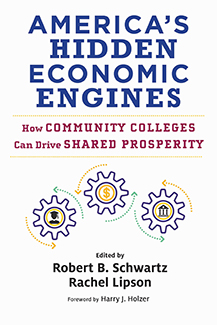Harvard University’s Project on Workforce (HPoW) has released a new book published by Harvard Education Press that features Northern Virginia Community College (NOVA) as one of five exemplar community colleges contributing to regional economic growth and opportunity.

Through five case studies of community colleges in Virginia, Mississippi, Ohio, Arizona and Texas, the book, America’s Hidden Economic Engines: How Community Colleges Can Drive Shared Prosperity, explores ways in which forward-thinking community colleges are designing and implementing new solutions to both adapt to critical needs in the U.S. economy and create new pathways to opportunity for a diverse range of learners. NOVA excels at partnering with employers to build new degree and non-degree certificate programs that meet in-demand industry needs. The college utilizes labor market intelligence data to identify “on-ramps” for students to more effectively enter the workforce economy.
In addition to NOVA, the four other colleges – Mississippi Gulf Coast Community College, Lorain County Community College in Ohio, Pima Community College in Arizona, and San Jacinto Community College in Texas – each serve very different learner populations and meet different local workforce needs, but they have all implemented practices to respond to the needs of their regional economy and to foster new opportunities for equitable growth. Those promising practices, which are detailed in the book, include cultivating innovative leadership teams, working to attract businesses to their communities or help build and grow new ones, building flexible programs that meet workers where they are and making career advising an integral part of developing educational pathways from two- to four-year colleges, among other activities.
“The institutions profiled in the book demonstrate the profound potential of community colleges as drivers of regional economic growth that serve the populations who are too often left behind by so-called ‘traditional’ higher education. But too often, two-year institutions struggle with the need to be everything to everyone — without the resources to do so effectively,” said Robert Schwartz, Senior Advisor, HPoW and co-editor of the book. “We hope the findings of the book serve as both an inspiration and a motivation to not just community college leaders seeking to accelerate regional economic growth — but also state leaders who recognize the critical importance of funding community colleges as engines of growth and prosperity.”
Northern Virginia Community College (NOVA) sits at the forefront of efforts to ensure economic opportunity is shared more broadly. To achieve this mission, NOVA has embraced a strategy to build more on-ramps to the local economy and transform itself as a jobs-first hub in the region.
This project was started in 2021 under the leadership of Robert Schwartz and Rachel Lipson, cofounders and inaugural directors of the Project on Workforce and co-editors of the book, along with support from case authors Hayley Glatter, Analisa Sorrells, Furman Haynes, Rachel Boroditsky, and Sakshee Chawla. Harvard’s Project on Workforce is a collaborative effort between the Harvard Kennedy School's Malcolm Wiener Center for Social Policy, the Harvard Business School Managing the Future of Work Project and the Harvard Graduate School of Education.
Support for this project came from a private foundation and the Capital One Foundation. To learn more about the book or to order copies, visit here. For media questions, please contact Hoang Nguyen, Associate Director of External Communications at nvcc.edu.